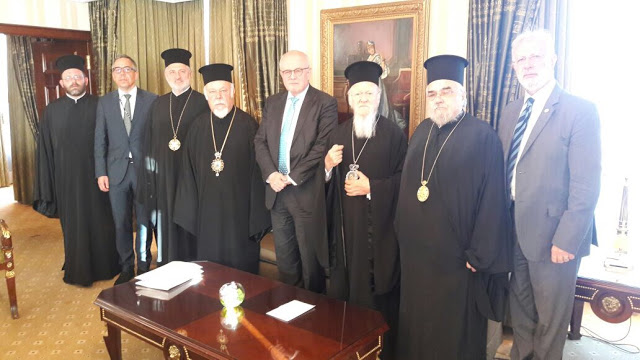
From 29 May until 2 June, 2017, His All-Holiness Ecumenical Patriarch Bartholomew travelled to Germany to visit the Evangelical Church in Germany, which is celebrating the 500th anniversary of the Reformation. The Patriarch was invited by the Rt. Rev. Bishop Heinrich Bedford-Strohm to attend the celebrations.
During his visit, the Patriarch met with the Minister President of the state of Baden-Württemberg, His Excellency Winfried Kretschmann, received an honorary doctorate from the historic University of Tübingen, and traveled to Berlin where he was invited by the Konrad Adenauer foundation to deliver a lecture entitled “Orthodoxy and Human Rights”. The Patriarch also met with the new President of the Federal Republic of Germany.
Receiving honorary doctorate for his contribution to Orthodox-Protestant dialogue from Tübingen University on 30 May, the Ecumenical Patriarch underlined that there is a growing interest in Martin Luther in the Orthodox Church, above all in Luther’s concept of freedom. He himself welcomed this increasing interest on the part of Orthodox theologians as Luther’s concept of freedom had a turning point in the history of the understanding of freedom and was therefore of “epochal significance” for Christianity’s dialogue with the modern world. There was, however, a “deep rift” between the Christian concept of freedom and the modern idea of freedom in the Western world, the Patriarch warned. Whereas Christian freedom was a gift of God, the modern idea of freedom was self-centred, promoting a version of self-realisation that eventually led to self-isolation.
Addressing the Konrad Adenauer Foundation in Berlin on 2 June, the Ecumenical Patriarch defended the concept of human rights against criticism from fundamentalist Orthodox circles. He also criticised those non-Christian religions which believed that human rights were confined to Western culture and were a symbol of Western imperialism. Even if the Christian Churches had at first opposed human rights, they were nevertheless now deeply rooted in Christian culture, he said. It was unacceptable for religions to undermine human rights instead of supporting them. This was more important than ever today as human rights were by no means guaranteed and defending them was a permanent challenge.
The Patriarchal delegation was comprised of Their Eminences Metropolitans Augustinos of Germany, Gennadios of Sassimon, and Elpidophoros of Bursa, the Very Reverend Deacon Theodore, and the esteemed Archon and Professor Dr. Konstantinos Delikostantis.